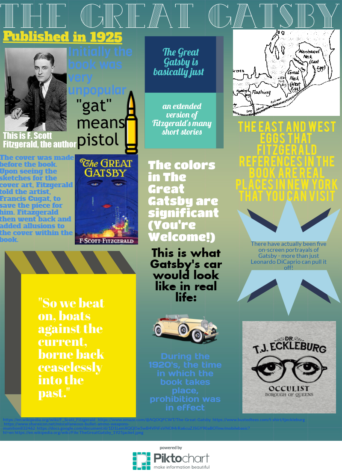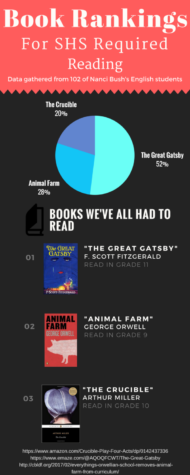‘The Great Gatsby’ is greatly overrated
January 11, 2018
 Melissa Ellin
Melissa Ellin
People say you are significantly less likely to enjoy something if it is forced upon you.
This can be applied to reading as well. If you like to read, required reading may not bother you, but the annotations will take their toll and soon will have you cursing the pen’s very existence.
Regardless, you read the books and more times than not, look back on them with a fondness, even declaring a school book as one of your all time favorites, but other educational book endeavors… not so much.
F. Scott Fitzgerald’s “The Great Gatsby,” written during the “roaring twenties” and the infamous prohibition, is one such book. Almost every person reads the book in school, and many people enjoy it. It is the fictional story of Jay Gatsby, a true rags to riches man who falls in love with Daisy, the golden girl.
Although Gatsby is the story’s protagonist, he is not the narrator. The story is told through the eyes of Nick Carraway, Daisy’s cousin, making Gatsby the mere titular character, a person whose name may be in the title, but is not the narrator. The fact that Fitzgerald wrote the book in this format was his saving grace. The mystery surrounding Gatsby throughout the novel was the only reason that I didn’t use Shmoop for every chapter.
This is not to say that the book did not hold a higher value. It is an indisputable fact that Fitzgerald’s use of figurative language deserves reverence. On the other hand, when I look at the storyline alone, I could not say the same thing.
I am not a sappy romantic, and although I don’t mind the occasional romance here and there, I want some substance to a book. I do not want to spend one hundred pages listening to a man who is clearly stuck in the past (a motif throughout the novel) whine about the love he could have had. Especially when the love interest is one of the least likeable characters in the book.
None of the characters were all that amiable, but that was part of Fitzgerald’s criticism of the immorality of the people of the time. Due to the higher value of the characters’ less appealing attributes, they are not what bothered me. The real nail in the coffin was the concept of love that Fitzgerald developed. If it had merely been a comment on the 1920’s society and the lives of the rich versus the poor, and alcohol’s influence, I would have loved it. And yes, in a way this is exactly what the book was: a satire of the time that depicted what life was really like, but unlike “The Crucible,” or “Animal Farm,” this satire was not made for the sole purpose of being critical, but with the primary intention of being a love story.
When it comes down to it, Fitzgerald is a romantic to his core. Not a bad thing, as satire and romance can make for an exceptional pairing, as “The Crucible” demonstrated, but Fitzgerald’s Rubicon was letting his life experiences weigh too heavily on his writing. His past with his “golden girl” caused him to place one into each of his stories. Unfortunately, in “The Great Gatsby’s” case, Fitzgerald’s incorporation of a “golden girl” brought his downfall. The book revolved too much around Gatsby’s pining for Daisy. At some points I wanted to slap Gatsby for falling for her womanly wiles. He would have done anything for her, including moving, throwing tons of illegal parties and partaking in a shady business. Talk about desperation. Daisy was the pianist playing Gatsby like Beethoven’s finest composition, and Gatsby let her do so with ease.
So while I like the point that Fitzgerald was trying to make about wealth and respect, I feel as though he wasted the book on a love story that could have been downplayed, or at least used to highlight the satire.
My opinion is one among many. I can’t say that I wish I had not read the book because I have learned from the style and rhetoric utilized within the novel. I do not agree with Fitzgerald making the book as the romance-based novel it is, but I understand why this book holds the ranking that it does at Solon High School and in literary scholars’ eyes. Nevertheless, I may read the book again, but not because I enjoyed it, rather because of its standing.
Fitzgerald’s book may have evoked some tears, but they are for a lost satirical opportunity, not the love story.

 Melissa Ellin
Melissa Ellin